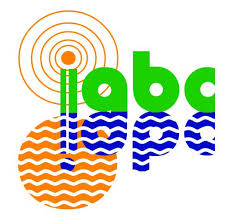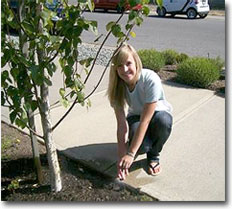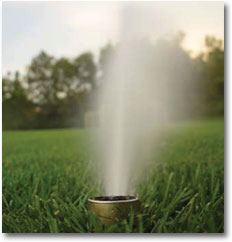Outdoor Water Conservation
Be WaterSmart Outdoors
Residents know that most of our precipitation occurs during the winter months. Records with Environment Canada indicate that, on average, our area receives only about 100 mm of precipitation during June, July and August combined (This is less precipitation than areas of the Okanagan Valley during the same time period!). Summer is also the time when the demand for water resources is highest. Consumption can increase by more than 50 percent over winter use. Most of this is used to 'inefficiently' water lawns and gardens.
WaterSmart Tips!
- *NEW* FireSmart and WaterSmart Landscaping Guide
-
WaterSmart and FireSmart landscaping is all about making design choices that maximize water retention as well as reduce fire risk. This landscape guide combines these principles with the East Coast of Vancouver Island climate and native species in mind. Download your copy here: FireSmart and WaterSmart Landscape Guide
- Rainwater Collection
-
- Collect rainwater in a barrel, cistern or water-features to save for use in drier conditions.
- Rainwater is at a more ambient temperature for your plants and it's free!
- Collecting rainwater helps reduce the amount of toxic run-off that enters our storm drains and eventually our streams and ocean.
Links
-
Team WaterSmart Brochure - Utilizing Rain Barrels
- Video - Building a Rain Barrel
- Shaw TV Nanaimo Segment - Ties with Nature
- Lawns
-
- Aerate your lawn & top-dress with compost to improve water penetration and retention.
- Deep but infrequent watering maintains a healthy root system. Inspect your system frequently to make sure there are no leaks.
- Let your lawn go 'dormant' or golden in the summertime. It will go green again with the Fall rains.
- Reduce your turf area if you can - consider planting native species to 're-wild' your landscape.
Links
- Team WaterSmart Brochure - Healthy Lawn Care
- Trees, Shrubs, And Plants
-
- To reduce losses due to evaporation, water early in the morning.
- Consider installing water-efficient irrigation such as bubbler or drip systems that deliver water right at the base of the plant.
- Mulch around plants with straw, leaves, or live groundcover to conserve soil moisture and moderate soil temperature.
- Increase water retention of your soil by adding compost - this will improve soil structure and support healthy microbes.
- Prevent flower pots & hanging baskets from drying out by adding a perforated plastic liner.
- Vegetable Gardens
-
Maintaining a vegetable garden through a drought can be a challenge. The principles of xeriscape can lend themselves very well to growing vegetables during periods of limited water supply.
Here are a couple more tips:
- Excessive watering leaches nutrients out of the soil, encourages diseases and reduces flavor; consider a drip irrigation system.
- When planting water-loving plants such as tomatoes, line the soil with a thick layer of newspaper to maximize water retention.
- Practice companion planting by placing plants with similar water requirements close together.
Residential Irrigation Initiatives
Up to 65 percent of water used to irrigate our lawns and gardens is lost to inefficient watering practices which result in runoff, evaporation, or leaks.
Learn all about regularly maintaining your irrigation system from our Top 10 Irrigation Tips brochure!
- FREE Residential Irrigation System Check-ups
-
Since 2010, hundreds of residential irrigation check-ups have been performed by Team WaterSmart staff. The program has effectively caught leaks, lowered excessive watering times and advised on water-saving techniques.
Unfortunately due to COVID-19, our popular program will not be running in 2020. Please call 250-390-6560 or email watersmart [at] rdn.bc.ca (watersmart[at]rdn[dot]bc[dot]ca) if you require more information.
- FREE Workshop for Residents: Efficient Irrigation
-
For those who cannot participate in the Irrigation Check-ups, we often offer workshops to encourage people to inspect their own systems.
Check out our upcoming workshops and if you'd like to check your own irrigation system, see our step-by-step guide to find out how!
- Certified Irrigation Professionals
-
To promote water conservation and the design and installation of efficient irrigation systems, the Irrigation Industry Association of BC's (IIABC) offers several training courses.
To find a certified technician, designer or contractor, visit the Irrigation Industry Association of BC's Website.
- Efficient Irrigation Round-Table: Municipal & School District Crews
-
In March 2012, members of municipal and school district grounds crews in the RDN got together to discuss efficient irrigation practices in their line of work. It was an opportunity to share ideas, suggestions and experiences while working together towards the common goal of efficiency.
The round-table discussion lead to a compilation of "best practices" which can be referenced here: Efficient Irrigation Roundtable Discussion Summary



Links:
- Irrigation Industry of British Columbia - An excellent resource for irrigation system installation, maintenance and more.
- Capital Regional District - Waterwise Irrigation
Xeriscape Gardening
Xeriscape gardening is a systematic concept of saving water in landscaped areas - this means using fewer resources while still having a beautiful landscape. Practicing xeriscape can reduce water use by 70 per cent or more. You can visit the RDN's Xeriscape Garden at 846 Yambury Road, Qualicum Beach.
The Seven Principles of Xeriscape:
- 1. Plan and Design… for water conservation and beauty from the start.
- 2. Create Practical Turf Areas… of manageable sizes, shapes and appropriate grasses.
- 3. Use Appropriate Plants... native plants and those with low water needs will allow maximum water conservation.
- 4. Soil Improvement… your landscape will benefit from the addition of sphagnum peat moss, compost, aged manure or other decomposed organic materials.
- 5. Use of Mulches… these cool soil, minimize evaporation, reduce weed growth, slow erosion and provide landscape interest.
- 6. Water Wisely… consider the efficiency of your system, when you water and how frequently.
- 7. Good Maintenance… keeping your watering system free of leaks, mowing, weeding, pruning and fertilizing on a regular basis.
General Outdoor Conservation Tips
- Wash your car using a bucket of water, a sponge and a hose fit with a shutoff nozzle.
- Use a broom instead of water to remove debris from paved surfaces.
- Cover swimming pools when they are not in use to reduce evaporation, consider a water-saving pool filter.
Links:
- Grow Me Instead - Plant Guide - by the Invasive Species Council
- Building a Rain Barrel - easy step-by-step on how to build a rain barrel
- Great Plant Picks for the Pacific Northwest - Plants lists for drought-tolerant species
- Native Plant Society of British Columbia - Information on Native Plants of BC.
- VanDusen Botanical Garden - Information on water conservation, native plants, and water-wise gardening.
- Healthy Lawns - Health Canada resources Xeriscaping